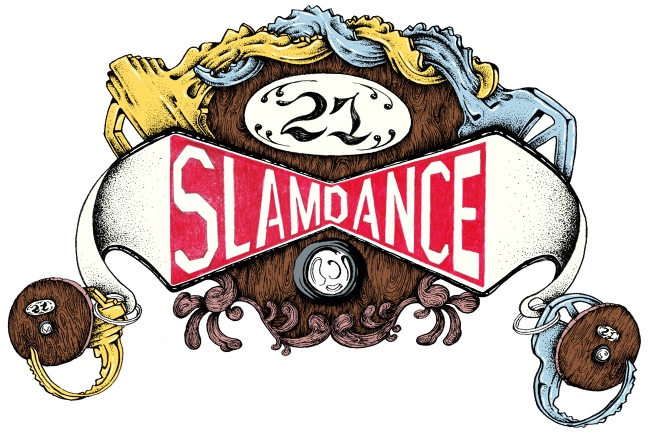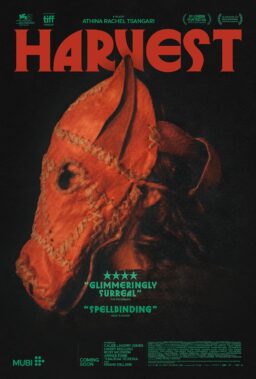In the heart of Park City, just up the road from where the bulk of
Sundance’s films are being shown is Main St. It’s not the place for those who
have problems with the mountain air on the slanted avenue, or anyone uninvited
to the many parties or swag outlets that advertisers are inviting celebrities
to sample. For movie lovers though, if you are not seeing something at the
Egyptian Theatre, you could be seeing something at the Slamdance Film Festival.
Running almost concurrently with Sundance’s dates, one can often sample films
that the other fest in town could not find room for. Which is not to say this
is a fest of also-rans as it has been the home of such premieres as “The
King of Kong,” “Dear Zachary” and Christopher Nolan’s first
feature, “Following.” Was there another potential breakthrough film
or filmmaker this year?
Among the narratives this year, the jury singled out Britni West’s
“Tired Moonlight” about a
maid (Liz Randall) in a small Montana town who scrounges around for discarded
junk and reconnects with a poet (Paul Dickinson) who has come back to settle
his mother’s estate. Honorable mention went to Perry Blackshear’s “They Look Like People,” a
tale of schizophrenic paranoia and the rekindling of a friendship hampered by
the idea that one of them believes evil creatures disguised as humans are out
to get him.

Another honorable mention went to Nisan Dağ & Esra Saydam’s “Across the Sea” which also
won the Narrative Audience Award. Damla (Damla Sönmez) is a pregnant woman
living in New York whose husband convinces her to take a trip back home to
Turkey, unbeknownst that she moved away there for a reason. There is an
intriguing setup on confronting painful memories of the past. Of course if the
pain was so great, one would hardly be so accepting of the opportunity
especially in the late stages of pregnancy. This is just part of what gets
buried in the sand over the course of a very uneventful first hour until Damla
comes directly face-to-face with her old boyfriend, Burak (Ahmet Rifat Sungar).
Did he cheat on her? Abandon her? Assault her mentally, physically or sexually?
When the film finally gets around to answering these questions, it is well past
the point of our involvement in these characters’ behavior. Damla is too quiet
and pouty to ever justify her rationale for returning. Only Sungar’s Burak
comes close to a fully-rounded character, and, because of the distance we are
asked to keep from him in light of the potentially damaging disclosure, any
empathy is too clouded to make the journey worthwhile.
Over on the documentary front, the jury’s honorable mention went to
Jeremy Royce’s “20 Years of
Madness” about the fall of a cable access show that was a prelude to
more well-known personalities like Tom Green and Johnny Knoxville. But it was
both jury and audience that agreed on Ben Patterson’s “Sweet Micky for President,” the story of how musician
Michel Martelly made a run for President of Haiti backed by Pras Michel of the
Fugees. It’s an utterly unlikely tale that almost starts like a joke until he
becomes a legitimate candidate against the backdrop of a corrupt government and
public upheaval. Throw in a little opposition from Wyclef Jean and support from
Haitian activist Sean Penn and you have the makings of an equal part real-life
satire and a document for change where it seems impossible. Patterson’s film is
lively, candid and has the arc of a Hollywood underdog tale in the best sense.

Activism also finds a strange bedfellow in “Dennis Rodman’s Big Bang in Pyongyang,” which chronicles
the former basketball superstar’s journey to North Korea and his newfound
relationship with “supreme leader” Kim Jong-un. Slightly amusing in
the wake of the recent scandal with “The Interview,” the documentary
gets seemingly unfiltered access during the trips that led Rodman and other
players to organize a basketball game in the hopes of bridging some kind of world
peace gap between the nation and America. What follows goes beyond farcical, especially
as Rodman is seen making a drunken fool of himself in more than just that
infamous ESPN interview. Colin Offland’s film employs a constant narration that
makes the film feel like a propaganda piece edited by the dictator’s PR team
(or, at least, a parody of one) and the idea that a flamboyant alcoholic as an
ambassador is somehow better than the closed door tactic the American government
has employed is a stretch that makes this feel like a sad reality show.
Alcoholism gets a more knowing treatment in Steve Yu’s “The Resurrection of Jake the
Snake.” Wrestler Jake Roberts was the subject of one-third of 1999’s
“Beyond the Mat” (the best third) and here we are 15 years later and
things have not improved for the one-time WWE superstar. In the hopes of
getting back in shape and being invited as a surprise guest for the annual
Royal Rumble, Jake moves in with “Diamond” Dallas Page who has become
a Yoga guru and self-help master in his second career. Yu’s film never shies
away from the difficulty in keeping Roberts’ focus as he becomes belligerent
and confrontational any time a hint of alcohol crosses his path. The harshness
of these moments is what makes this comeback story so riveting and often
painful to watch since each shimmer of light is often quickly shuttered by the
darkness in Roberts’ soul. One does not need to have a background in wrestling to
appreciate a story that practically feels like the inspiration for Darren
Aronofsky’s “The Wrestler,” complete with the aches of a body breaking
down and the reconciliations that make the road to triumph all the more potent.

The mood is significantly lightened with Brian James O’Connell’s “Bloodsucking Bastards.”
Slamdance seems to find room for at least one comedic horror film each year and
this one certainly leans heavier on the gags than the gore (though it is
plentiful, if mostly to comic effect.) It stars Fran Kranz (of “The Cabin
in the Woods”) as Evan, just another drone in an office where literally
nothing seems to get done. With the arrival of a new boss (“Game of
Thrones'” Pedro Pascal), production suddenly goes on the rise, and Evan is
determined to get to the bottom of it. Maybe “determined” is not the
word as he takes longer to catch on than Simon Pegg in “Shaun of the
Dead” but to be fair he does not have the benefit of knowing the title of
the movie. The end result is pretty fun. Goofy and ridiculous and back to
goofy, but fun. Kranz and Joey Kern play the material as right as it possibly
could be and if you are a fan of Scream Factory’s line of special edition
Blu-rays, you are in luck as Shout! Factory picked it up to join their growing
cadre of indie genre efforts.
Light fare such as that tends to work better nestled in-between
intense dramas and coming-of-age memoirs, but it is hard to deny the films that
tap into what makes us human either. That is why Dana Nachman’s “Batkid Begins: The Wish Heard Around
the World” is such a special experience and my undeniable favorite of
the festival. Five year-old Miles Scott captured the attention of social media
and the world when the Make-a-Wish foundation granted his request to be his
favorite hero. The simple request turned into a production that would make most
Hollywood films envious and the result is a story that is impossible not to get
attached to on an emotional level.

Kurt Kuenne, who made one of the (if not THE) most gut-wrenching
documentaries of all time, “Dear Zachary”, lends his writing and
editing talents to this film which he calls “probably the greatest
Capra-esque event of modern times.” Forget the cynicism of it being a
commercial for Make-a-Wish (as if that would be such a bad thing), ignore the
criticism of the event’s expense (a point quickly quashed in the film) and just
give yourself over to a story that is like watching the creation of a work of
art from its behind-the-scenes preparation (filled with some eye-wiping
surprises) to its fully-realized unveiling.
Kuenne noted, “While cutting it, the profound implications of
this event became more and more apparent to me; if thousands of people could
decide independently to be this kind and loving for a day – not just to a
little boy, but to each other – couldn’t we actively make that decision all the
time? And why don’t we? To me, it showed proof that we’re capable of deciding
to make this world a wonderful place if we really want to.”
Julia Roberts evidently agreed as she picked up the rights to
remake the film as a narrative. Hopefully that will not sideline “Batkid
Begins” in any way since witnessing the actual events unfold allows an
unfettered poignancy that could just as easily be lost through the manipulation
of Hollywood storytelling. Nachmann’s film is the ultimate feel-good story.
Though it is easy to contrast “Batkid Begins” with “Dear
Zachary”—tears of heartache are replaced with tears of joy—both films are
about coming out of the other side of tragedy with a positive outlook for the
future and rewarding the often thankless task of being a great parent. It also
shows that film festivals are not just a place to discover new films and
promising talent, but a great place to rediscover one’s own humanity.











